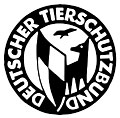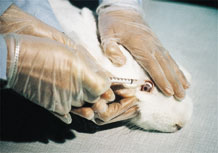 ANIMAL PROTECTION
ANIMAL PROTECTION 
The strong double for
 ANIMAL PROTECTION
ANIMAL PROTECTION 
Cosmetics according to the guidelines of the German Society for the Prevention of Cruelty to Animals ( Deutscher Tierschutzbund e. V. )
The German Society for the Prevention of Cruelty to Animals and the International Manufactory Association against Animal Testing in Cosmetics ( IHTN e. V.) carry on their consequent work against animal testing in 2001
Animal experiments are still demanded from 2000.
EU doesn't accept alternative methods.
Since many years of close cooperation with the German Society for the Prevention of Cruelty to Animals and the IHTN e. V. has been fighting for the prohibition of animal experiments in cosmetics. There are enough well- tried raw materials and natural substances which can be used for cosmetic production. The Federal Ministry for Health which is responsible for cosmetics and the federal ministry for nourishment, agriculture and forestry which is responsible for animal protection don't show any sign to demand a complete prohibition against animal experiments -at least in Germany- from 1998. In a plan for the completion of the food- and essential commodity law as well as in the novelle of the animal protection law, the prohibition of animal experiments is restricted by the solutions of the EU. This means that according to the existing plans in Germany, the national law will be completely adapted to the European law. As a consequence , animals will still be killed in cruel cosmetic tests.
Although the transference of animal testings to people has been questioned, by critical academics for a long time, the industry and the policy keeps to cruel experiments on animals.
Transference of animal testing
While a rabbit can eat a whole basket of toadstools, a person would die after having eaten a single toadstool. But the lobby of animal testers defends its position as follows:
"Is it better when your child's eyes are injured or do you prefer the eyes of a rabbit?"
Certainly not a single mother would make a decision in aid of the rabbit. With these kind of arguments these people try to convince the general public of the necessity of animal experiments. If animal experiments were a reliable testing method for the protection of the consumer, it would not be necessary to cross several chemicals yearly of the temporary list. Increasing allergies and incompatibility of products, however, confirmed the opposite- there is no consumer safety when products are tested on animals. The consequences have to be beared by the health insurance and not by the cosmetic industry.
There is a duty for animal experiments only for chemicals
The cosmetic ordinance comes under the food- and essential commodity law. For natural and eatable raw products as avocado oil, almond oil and cocoa butter etc. no animal experiments are prescribed. Natural raw products have been listed in the German Medicine Book for decades and the compatibility of these products has been tested sufficiently on people. Before a new chemical can be used by the consumer it has to be tested on animals. For each new chemical the following methods are prescribed by the chemical law:
Draize-test (Muscous membrane compatibility test)
At this test rabbits are driped the testing chemical in the eyes. As rabbits don't secrete tears the substance remains at least 24 hours in highly concentrated form in the eye.
Strong irritations, burns and the destruction of the eye can be the consequence.
LD 50 test (Toxicitytest)
In the LD 50 test for the characterization of acute toxicity, the dose of a chemical has to be found out. This test kills half of the tested laboratory animals. Either the chemical is mixed in the feed or the animals are forced by pharynx sound to swallow them. For this testing method, per substance at least 30 animals often even more are used. Over several days the occupying convulsions, paralysis and other damages are taken down.
Skin stimulating test
The testing substance gets into the shaved and partly injured skin of guinea- pigs and rabbits. Strong skin irritations, inflammations and eczema can come up. In order to prevent the animal from lecking themselves, they are tied to a rack and they have to wear neck protections.
We don't accept animal experiments!
 |
Irritation tests for UV- filters.
The animals are irritated until there are different burning degrees on their skin.
"Cosmetics without animal testing"
"Product is not tested on animals" etc.
These slogans engender sympathy but don't prevent experiments on animals .
Animal testings on the end product are not prescribed by law. Therefore a product- orientated advertisement is according to § 3 against the competition and also a deception of the consumer. These slogans make the consumer believe that the whole product is not tested on animals. But mostly the raw materials of a cream or lotion are tested in animal experiments. Generally, preservations- perfume- and dye substances, synthetic emulsifier, UV- filter etc. have been mainly tested on animals.
"flexible five-year period"
Within a flexible five-year period producers are allowed to put their names down on the "positive-list" - but the declarations of the producers are not controlled in detail. Further animal experiments are not prevented by this measure. Instead chemicals which for example had been tested on animals in 1990, can be processed again by the producer in 1995.
The German Society for the Prevention of Cruelty to Animals is the first organization that has clearly demanded to abolish experiments on animals and to create consumer transparency for more than 15 years.
To ensure consumers that not just the raw materials but also the complete declarations of the producer are exactly and independently controlled, the "German Society for the Prevention of Cruelty to Animals" publishes a so- called positive list for cosmetics connected with the symbol "rabbit with protecting hand".
Active animal protection begins with the buying attitude!
Thus the symbol "rabbit with protecting hand" guarantees that the cosmetic producers definitely work according to the strict guideline of the "German Society for the Prevention of Cruelty to Animals" and that they have been totally rejecting experiments with animals since 1979.
The symbol of responsibility ... 
and the guidelines of the German Society for the Prevention of Cruelty to Animals e. V., Bonn:
IHTN e.V.Feldkircher Straße 471522 BacknangGermanyTel: 0049 (0) 7191 - 97 97 920Fax: 0049 (0) 7191 - 91 10 121
Webmaster: [email protected]